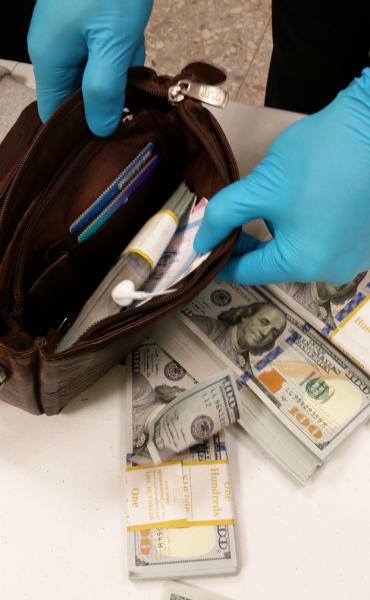Second Largest Dulles Currency Seizure in 13 Years
STERLING, Va. — While conducting an outbound enforcement operation, U.S. Customs and Border Protection (CBP) officers seized more than $150,000 in unreported currency from a Ghanaian man on Saturday at Washington Dulles International Airport.

on September 23, 2017
The man, who CBP has not named because he was not criminally charged at this time, reported to officers that he possessed $10,000. The man reported that currency on a financial disclosure form and presented $10,000 in a zippered bag along with $200 and 100 Ghana cedis in his wallet. During a baggage examination, CBP officers discovered $40,000 concealed inside a pair of pants, and another $100,000 concealed inside a pair of sweatpants.
The total currency the Ghanaian man possessed equaled $150,228. CBP officers returned $2,228 to him as a humanitarian release so that he may continue his travel.
Travelers may carry as much currency as they wish into and out of the United States. Federal law requires that travelers must report all U.S. and foreign monetary instruments totaling $10,000 or greater on a U.S. Treasury Department financial form. None of the currency is taxed.
“We want travelers to feel comfortable carrying as much currency and other monetary instruments as they wish into and out of the United States, but we encourage travelers to honestly report all their currency to Customs and Border Protection officers during inspection,” said Elmer Jarava, CBP Acting Port Director for the Area Port of Washington Dulles. “We hope that this currency seizure sends a strong message about the consequences of violating U.S. currency reporting laws.”
This is CBP’s sixth largest currency seizure at Dulles since CBP’s inception in March 2003, and the second largest currency seizure in the past 13 years. The top two currency seizures, of $318,519 and $303,031, occurred in 2003, and more recently, a $156,023 currency seizure in 2014 tops this seizure.
On March 1, 2003, CBP consolidated the inspection services of the former U.S. Customs Service, U.S. Immigration and Naturalization Service, and the U.S. Department of Agriculture Animal and Plant Health Inspection Service. The U.S. Border Patrol remained intact and merged into CBP in its entirety.
“As the nation’s border security agency, Customs and Border Protection is charged with enforcing hundreds of laws and regulations at our nation’s international ports of entry,” said Casey Owen Durst, CBP’s Field Operations Director in Baltimore, the agency’s operational commander in the mid-Atlantic region. “CBP plays a critical role in helping to keep our communities safe, and it’s a responsibility that we take very seriously.”
Travelers are encouraged to visit CBP’s Travel section to learn more about the CBP admissions process and rules governing travel to and from the U.S.
CBP’s Office of Field Operations
Almost a million times each day, CBP officers welcome international travelers into the U.S. In screening both foreign visitors and returning U.S. citizens, CBP uses a variety of techniques to intercept narcotics, unreported currency, weapons, prohibited agriculture, and other illicit products, and to assure that global tourism remains safe and strong.
On a typical day, CBP seizes $289,609 in undeclared or illicit currency along our nation’s borders. Learn more about what CBP did during "A Typical Day" in 2016.
CBP's border security mission is led at ports of entry by CBP officers from the Office of Field Operations. Please visit CBP Ports of Entry to learn more about how CBP’s Office of Field Operations secures our nation’s borders.

